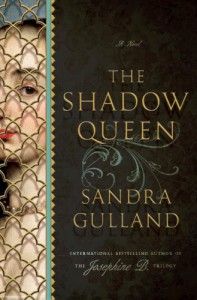Currently reading
Jennifer, Gwyneth & Me: The Pursuit of Happiness, One Celebrity at a Time
Mr. Mercedes
Arduino Projects Book
The Shadow Queen: A Novel
 I love historical fiction where the plot is tightly integrated with the setting. Sandra Gulland achieves that well here. The story could take place in very few other time periods and by following the plot, I learned a lot about this particular time period. The details of daily life as both a player and as a lady’s maid are fascinating and sometimes scandalous. The scenes the author chose to share painted a vivid picture of the poverty and opulence which existed side-by-side in the middle ages. The use of archaic terms, helpfully explained by a glossary, added to the ambiance. The writing did strike me as a little stiff at first, but as I got to know Claudette better, I began to feel the narrative style suited her. I was also swiftly distracted from thoughts about narrative style, as the action naturally built momentum and kept me constantly wanting to know what would happen next.
I love historical fiction where the plot is tightly integrated with the setting. Sandra Gulland achieves that well here. The story could take place in very few other time periods and by following the plot, I learned a lot about this particular time period. The details of daily life as both a player and as a lady’s maid are fascinating and sometimes scandalous. The scenes the author chose to share painted a vivid picture of the poverty and opulence which existed side-by-side in the middle ages. The use of archaic terms, helpfully explained by a glossary, added to the ambiance. The writing did strike me as a little stiff at first, but as I got to know Claudette better, I began to feel the narrative style suited her. I was also swiftly distracted from thoughts about narrative style, as the action naturally built momentum and kept me constantly wanting to know what would happen next.I felt we got to know Claudette pretty well, but Athenais was often the star of the show. Athenais reminded me a bit of Anna Karenina (which I loved!), because both are beautiful and alluring, but also reckless, even self-destructive, when passionately pursuing what they want. Much of Claudette’s life ended up being all about Athenais. I think some readers might actually like this, since Athenais is a fascinating character and the inequality of their relationship is appropriate to the times. However, I would have liked to see more of Claudette. Several incredibly emotional events happen in Claudette’s life during the course of the story. I thought some of these were glossed over too much, particularly those that occur when Athenais is around. I just didn’t get a good feel for Claudette’s emotions. Claudette also lacked agency, making only a few decisions for herself, and the end has the feeling of Deus ex machina Claudette and I both hate. Things just wrapped up too neatly with little help from Claudette.
Despite this small complaint, I really enjoyed the book as a whole. In fact, I think my wanting more of Claudette is indicative of how engaging the book could be at times. I’d definitely suggest giving this a chance if you like well-researched historical fiction which will immerse you in a different time.
This review first published on Doing Dewey.






